I’ve always wondered how the geography of Prince Edward Island maps over the geography of my home-place of southern Ontario. Now, thanks to Google Maps and Acorn, I know:
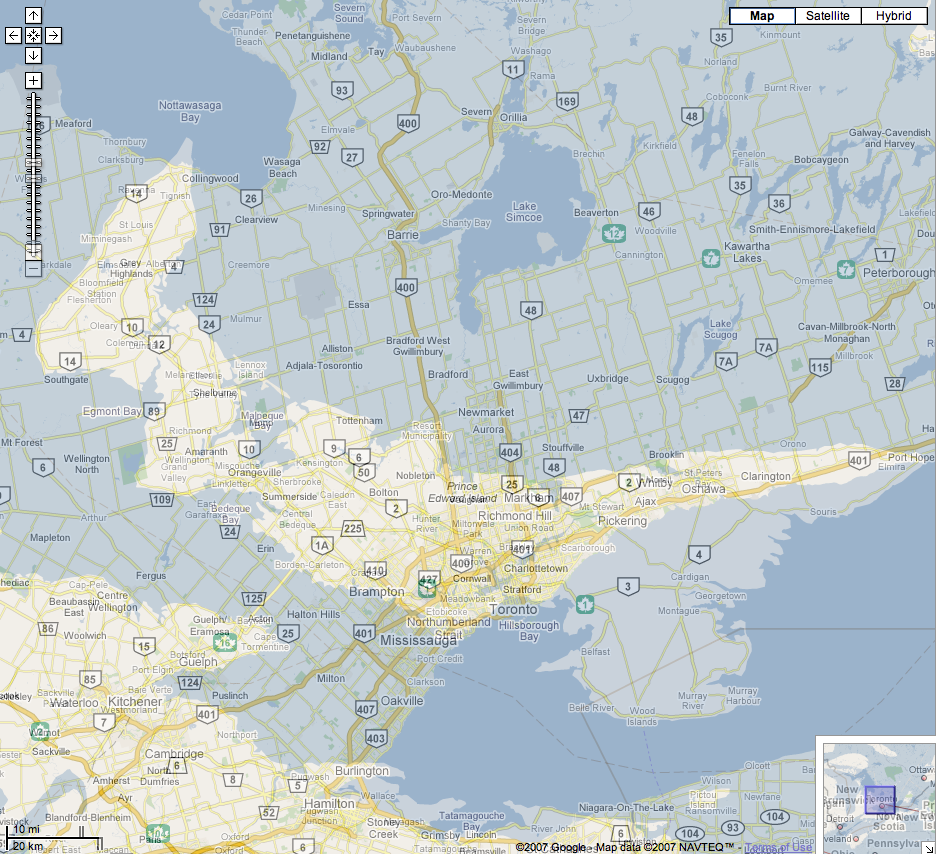
I’m sure variations in latitude and map projections mean this isn’t a completely accurate size comparison, but it’s an interesting ballpark nonetheless.
Every once in a while I get an email from one of you in the readership asking for travel advice. Sometimes the questions are specific — “I need a good hotel in downtown Boston” — but, more often than not, it’s general advice you’re seeking. Here’s a question like that from yesterday’s email:
I’m determined to take a trip to Europe next year with my boyfriend, and it will be my first trip abroad. I would really like to do a tour of Scandinavia and The Netherlands.
I don’t know anyone who has really visited that area… and you seem fairly proficient in securing seat sales, and finding neat places to stay and whatnot.
While every trip is different, and every traveler is different, here are suggestions, gleaned from my own experiences, that might help.
Pack light. This is the number one way to increase the enjoyment of any trip. Pack what you would normally think reasonable, then cut it in half. Don’t feel like you have to plan for every eventuality and ever possible weather event (you can buy a raincoat, or a sweater anywhere in the world). Ideally you will fit everything into one medium-sized backpack. The benefits: you don’t need to check your luggage on the airplane, if you’re in a new city in the morning it’s not a hassle to carry your bag with you before you check in to your night’s lodging, and, most of all, you’ll feel considerably more footloose and fancy free.
Don’t obsess about travel deals. If you travel in the off-season to Europe (late October to April) from Canada you’ll pay about $650 to $900 return per person for air travel. If you get a quirky good deal you can take this lower — we did Boston to Dublin return for $400 each last year, but we had to get to Boston! — but I’ve never seen the Air Canada return fare from Halifax to London lower than $398 before taxes ($646 all-in). This doesn’t mean you shouldn’t shop around, but don’t put off a trip just because you haven’t found the “deal of the century” on the airfare.
Consider your flight options. Even though I just suggested you don’t obsess about getting a deal, you have lots more options for getting to Europe from Atlantic Canada than ever before, and these are worth exploring for flexibility in price, destination and schedule: Air Canada flies Halifax to London; Zoom from Halifax to Belfast, Glasgow, London and Paris; Canadian Affair from Halifax and Fredericton to London; Condor flies from Halifax to Frankfurt; Corsair from Moncton to Paris; Icelandair flies Halifax to Reykjavik (and beyond). Add in flights that route through Montreal, and you have a lot of choice.
Think about flying from Charlottetown. It’s almost always cheaper to fly out of Halifax when you’re going to Europe. And while saving $300 or $400 might seem like a fantastic idea months before you leave, when you arrive in Halifax on your return flight and are faced with a 4 hour drive back to Charlottetown after sitting on an airplane for 8 hours after getting up at 3:00 a.m. Halifax time, you’ll wish you bit the bullet. The last couple of trips we’ve taken we’ve paid the Charlottetown premium, and have never regretted it.
Take a shower when you land. Whether you use an airport lounge (Air Canada has a very nice arrivals lounge at Heathrow) or public showers (almost all international airports have them tucked away somewhere, sometimes free and sometime for a small fee), you will feel about 100 times better after you shower, especially if you’ve flown overnight. You’re going to be battling jet lag, lack of sleep, and a journey to your final destination; it’s worth it to take an hour or two, have a shower, get a good breakfast, and then continue on.
Remember that Europe is small. Here are two maps that shows the relative size of eastern Canada and the U.S. to a good chunk of Western Europe:
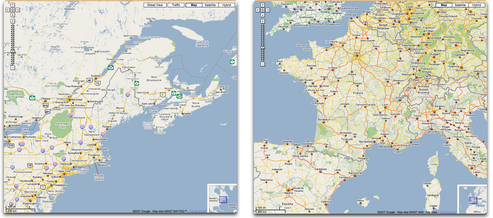
Google says that it’s a 11 hour drive from Charlottetown to Boston; which is about the same as the drive from Paris to Florence. This means both that you can see a lot of Europe relatively easily, and also that you can be flexible with where you start and finish your trip (when we took our cheap flight to Dublin last year our final destination was Porto, Portugal). The train and discount airlines can get you almost anywhere you want to go in Europe cheaply and quickly.
Consider small cities. If your regular everyday life is in Charlottetown, being dropped into the middle of London or Paris can be perplexing. There are a lot of smaller cities in Europe that are just as interesting and yet far more manageable: rooms will be cheaper, you will find your way around more easily, and you’ll avoid the lines and other congestions of the mega-cities. Who’s ever heard of Ancona, Italy, for example; yet it was my first experience of the country (we took the ferry across from Croatia and landed there), and it was fantastic. The secret of Europe is that almost anywhere — even the cities of which Lonely Planet says “a second-rate industrial city not worthy of your time” — are sufficiently different from Charlottetown to hold considerable interest. I’ve had loads of fun in Zaragoza, Perpignan, Cheb, and Genoa; I’ve only driven through Paris on the way out of town, and I’ve found London overwhelming every time I’ve visited.
Don’t bring guidebooks. While it might be impossible to resist the urge to pre-inform yourself about your destinations, I’ve found that every time I’ve traveled without a guidebook in hand — whether by decision or circumstance — the trip has proved more interesting. If you travel with a guidebook you’re going to end up at the places the guidebook sends you, whether for lodging, sights or food. Travel on your own wits, and using the advice of locals, and you’ll randomly end up in places you never imagined. A chance encounter with a Russian poster-art exhibition trumps a visit to yet another “significant Catherdral” any time.
Book a room for your first and last night. And then leave the rest to chance. Of course this is more difficult if you’re traveling in the heart of the season to a popular place. But if you’re in the off-season you’ll almost never have a problem finding a room, even if you show up in a new city at 4:00 p.m. It’s this approach that found us a room in a 500-year old building in the heart of Ceske Krumlov, a riverside guesthouse in Chiang Mia with awesome watermelon punch, and staying overnight at a bizarre health spa in Toplice. Not having an assured room is, of course, somewhat stressful, especially the first couple of times you go into it; once you realize that things have a way of working themselves out, and after the first amazing room-by-happenstance, you’ll never go back. That all said, having a room pre-booked for the night you arrive, and for the night before you leave, makes things a lot easier, and this is a time that random chance is best set aside.
Don’t underestimate the stress of travel on a relationship. No matter how much in love you are, how compatible your everyday lives are, how juiced you are to travel together, life on the road is different from life at home. Different enough that it’s almost like you’re starting a new relationship when you travel. Some lucky couples find their travel relationship sings as smoothly (or better) than their home relationship. Others finds themselves completely incompatible. I’ve had two friends each break up with their travel-partner mid-trip because of the unexpected stresses of travel (and, oddly given the trips were on different continents, the same woman was involved in both cases). Most people seem to find their way. But you have to be prepared to be twice as flexible as you usually are, learn to recognize the signs of a nearing total melt-down, and, generally, not expect things to work like they do off the road. If you’re planning an extended trip and have never traveled together, I suggest a short “training trip” somewhere close by (Toronto, New York, Boston) so that you can get a feel for your partner’s travel style. The last thing you want to do is end up in downtown Paris on your first afternoon only to find that you each interpret “hostel” in a completely different way.
Don’t worry about language. It helps to have a small phrase book in your pack to help with stickier situations. But you’ll be amazed how many people speak English (and 5 other languages) in Europe. And how much you can achieve with sign language. Remember that in any given situation there are only so many possible things that can happen: you walk into a bakery, you’re probably looking for bread; get on a bus and point to the fare box, you’re probably wondering how much the fare is. With this in mind you soon realize that there’s almost no situation than cannot be conquered; learn the words in the local language for “good morning,” “thank you” and “a cappuccino, please” and you’ll be set.
Don’t worry about money. Of course if you don’t have a lot of money you’ll have to worry about it at least some of the time. But with ATM machines in absolutely every corner of the world, and the Euro in use almost everywhere in Europe, the days of travelers cheques and wiring money and complicated currency exchange are over. Expect your credit card to be less useful in some places than you might expect (you can’t use a North American credit card to pay for French highway tolls, for example), keep a day’s worth of walking around money on hand, and if you’re traveling with a partner split your cards and cash between the two of you. Otherwise, rest easy in the thought that an ATM will never be more than a few blocks away and don’t walk around worrying about money: even if you lose your wallet (or it gets picked), the worst that can happen is that you pick up a pay phone, call back home and have some emergency cash sent Western Union. I lost all my travelers checks the morning after I arrived in South Korea 10 years ago, my mother get her purse snatched in Wenceslas Square in Prague, a friend got his wallet and passport lifted in Italy while he was asleep; in all cases we figured things out and continued our travels.
Consider a longer stay. While it can be fun to do a blitz through Europe — 10 countries in 15 days and the like — consider the possibility of traveling to one city, renting an apartment for two weeks, and traveling slow. You can find apartments for rent on craigslist and other similar sites — try Googling for “flat in Berlin” or “short-term rental Milan” and the like. You’ll pay a lot less, can unpack once, and you’ll get to know the food, people, and everyday life of your chosen destination in a completely different, more intimate way than if you breezed through in a few hours.
Some of these approaches will work for you, others will seem anathema. My best advice is simply to relax, be flexible, and seek out new experiences.
CBC Radio 3 is the only reason to get Sirius Satellite Radio. And now you don’t even need that: stream this. Cool.
From Flood Maps (about), three visions of the future of our house at [[100 Prince Street]] in [[Charlottetown]] as sea levels rise 7m, 9m and 10m.
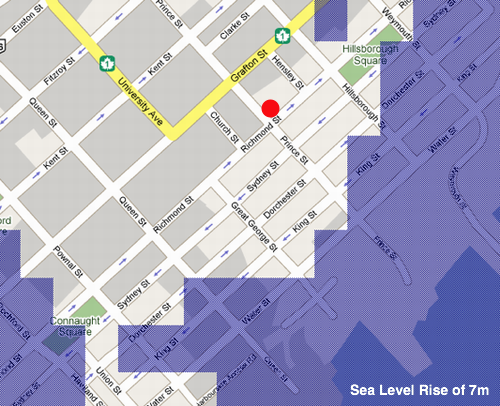
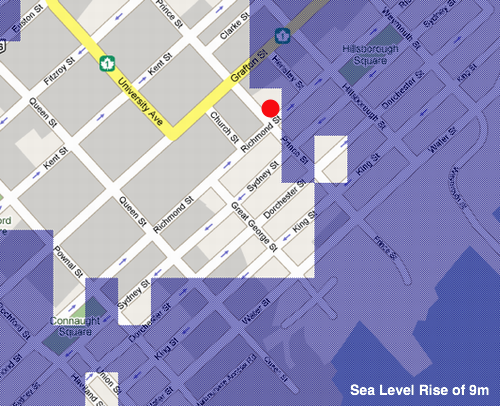
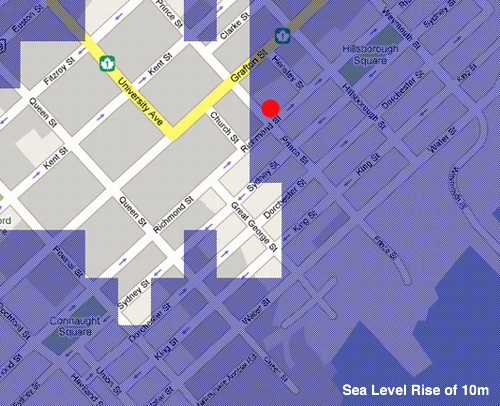
I’m on the tail end of a 12-hour trip to Toronto, a day squeaked out of a busy week to let me spend some time with my clients Bill and Laurence, they of Coleman Lemieux & Compagnie.
We spent the day at 304 Parliament Street, formerly the Salvation Army Citadel and now in the process of being transformed into a palace of dance.
When I arrived just after 10 a.m., Bill’s brother Paddy and his crew were halfway through the conversion of the old sloped theatre floor into a sprung dance floor; when I left at 8:00 p.m. the sub-floor was in and a prototype of the bounciness juice was in place.
Laurence and Bill have jumped into a daring project, a project they’ve been keeping alive almost entirely through sheer force of will; it was equally enthralling and exhausting to spend the day with them.
In there somewhere I spent 15 minutes on the phone with Bangalore trying to get Bell DSL installed, only to give up and try it myself. Which worked. Then I dashed out and bought a wifi access point at Staples and returned to find a sweet spot of telephone jack, power, and avoidance of construction debris to connect wifi and DSL. Which partially worked (there is a DSL router in the middle of their kitchen floor for the time being).
We also picked up Jimmy and Juliet from school, shared a slice of pizza and a Brio for lunch and a family dinner of Greek salad for dinner, and concocted grand plans for colemanlemieux.com. And had another round of lofty discussions about best practices for running a dance company with no staff and endless ideas.
It was fun, pointless, and practical all. And proof, perhaps, that however powerful our e-networking tools are, sometimes it’s important to pop in for a visit to get a real sense of what’s going on.
The CBC reports that the “City of Charlottetown is looking at replacing its conventional holiday lights with LED lights to save energy.”
Excellent. Great idea. Go for it.
The report also suggests, however, that “city staff will travel to Toronto later this year to learn what that city has done with LED lighting.”
Huh?
Not only does this not seem “environmentally friendly” (to use the city’s words), but it seems, at least on the surface, the kind of thing that could be solved with a 30 minute telephone call.
Making Great Websites is a set of slides I used last night when I spoke to the Annual General Meeting of the Voluntary Resource Centre (which, as it turns out, doesn’t have a website).
I need a small bit of help: I’m building a PyS60 that needs to be able to send SMS messages. I’m sending the message as follows:
import messaging messaging.sms_send(recipient,message)
The problem I’m encountering is that this puts the SMS in the Outbox of my [[Nokia N70]], and the application hands until I manually navigate to there on the phone, select the message, and then choose Options \| Send.
Obviously what I’d like this to do instead is “just send the message.”
This doesn’t seem to be something limited to my application: any other SMS-sending Python app I’ve tried suffers the same fate.
I’ve released a new version of PresenceRouter that includes support for Fanfou, a Chinese Twitter-like web service.
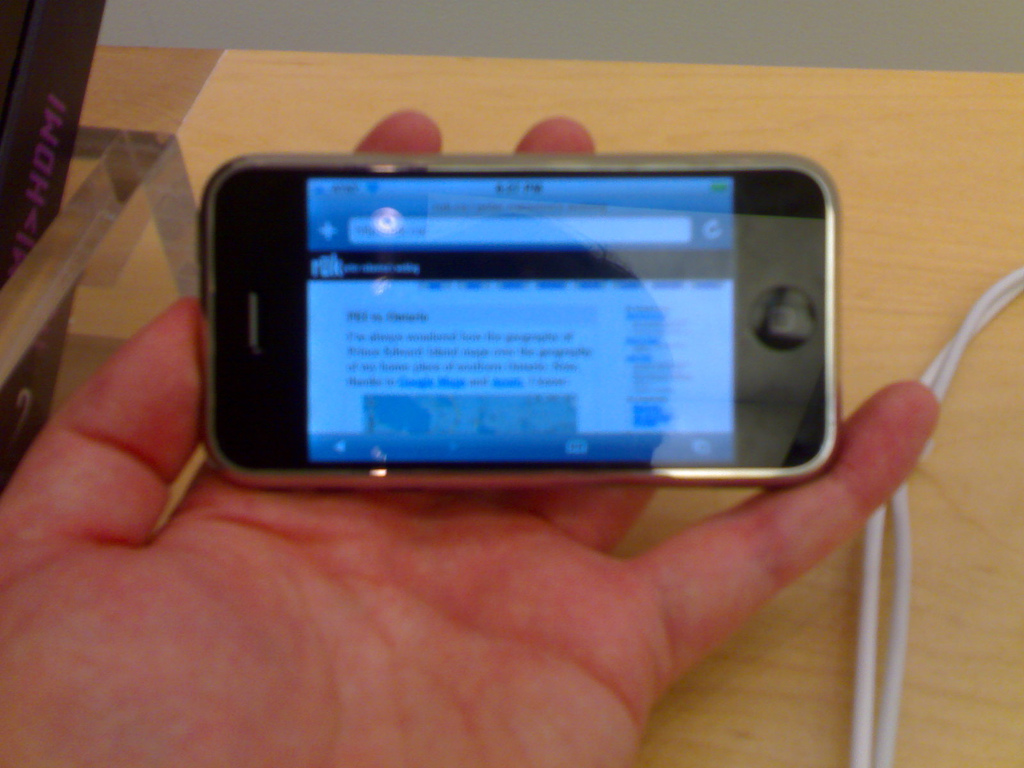
 I am
I am